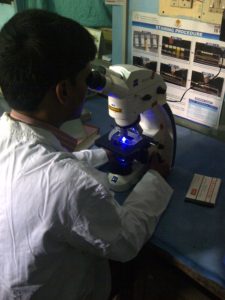 As the Prime Minister of India speaks to the US Congress today, a neglected epidemic threatens India’s progress. It’s not Ebola or Zika, but rather tuberculosis—an ancient disease that silently kills one Indian every 90 seconds. In one year’s time TB will sicken over 2.2 million Indians and kill 300 000. Between 2006 and 2014, TB cost the Indian economy a staggering $340 billion. Because TB strikes people in the prime of their lives, it’s the third leading cause of healthy years of life lost.
As the Prime Minister of India speaks to the US Congress today, a neglected epidemic threatens India’s progress. It’s not Ebola or Zika, but rather tuberculosis—an ancient disease that silently kills one Indian every 90 seconds. In one year’s time TB will sicken over 2.2 million Indians and kill 300 000. Between 2006 and 2014, TB cost the Indian economy a staggering $340 billion. Because TB strikes people in the prime of their lives, it’s the third leading cause of healthy years of life lost.
India also has the highest number of patients with multidrug resistant TB in the world, including cases that are nearly impossible to cure. Of all the superbugs now raising alarm, drug resistant TB is the only one that is airborne. TB respects no national boundaries, and extensively drug resistant TB has been called Ebola with wings.
Although India has the world’s largest TB epidemic, quality of TB care remains suboptimal, especially in the private and informal sector where most patients seek initial care. The average TB patient is diagnosed only after several months and seeing multiple providers, most of whom do not follow standard guidelines. Most patients who start treatment are not tested to see if their TB is drug resistant. Those who are found to have multidrug resistant TB must endure years of therapy with serious adverse effects. Apart from poor care, TB in India is fueled by broader socioeconomic factors, including extreme poverty, high prevalence of malnutrition, smoking, and diabetes.
Yet despite these challenges, India has made impressive contributions in global health. India has been polio free for over five years, and this success has provided huge momentum to global efforts to eradicate polio. Indian drug manufacturers dominate the production of TB and HIV medications, accounting for more than 80% of the global market. The recent launch of a rotavirus vaccine produced in India has underscored the country’s leadership role in childhood immunization. And Prime Minister Modi’s government has significantly expanded access to life saving children’s vaccines.
Tuberculosis is also now on Prime Minister Modi’s agenda. Last month he directed his health ministry to ensure that tests for drug resistant TB be installed in all districts, and also called for a district level review of the TB control program. He also used a national radio address to call on Indians to end what he called a tendency to be “careless” about the disease and to get checked if any symptoms arise.
India has begun to scale up modern, rapid molecular tests to diagnose TB and drug resistance, and it has launched Nikshay, an electronic platform for case notification and tracking. It is also experimenting with innovative ways to engage the massive private sector to improve care and reduce costs to patients.
Bollywood star Amitabh Bachchan, a TB survivor himself, recently teamed up with corporate leaders to call for greater action against TB and end the pervasive stigma around the disease. The US government has been a partner in India’s TB control efforts, with the US Agency for International Development (USAID) contributing over $100 million since 1998. But the US can do more, financially and through technical support.
A critical missing element is funding. India currently spends only 1.2% of its GDP on health. This is one of the lowest per capita investments by any country in the world. This underinvestment in health is clearly reflected in India’s TB budget. From an economic standpoint, there would be huge gains in ending TB globally, with US$ 1.2 trillion overall economic return on investment. The scale-up of TB control has been a very cost effective strategy for improving the health status of India’s population, with exceptional return on investment from a societal perspective. From an economic perspective, investing in the Global Plan to End TB will deliver India US$ 364 billion as overall economic return.
One quarter of the world’s TB cases are in India. So, global TB elimination is an impossible goal without significant progress in this emerging superpower. With its strong research expertise in TB, and technological and pharmaceutical capacity, India has the potential to make great progress against this disease. And with strong financial and political commitment from Prime Minister Modi, the engagement of both public and private sectors, and continued engagement with the US and other partners, India can not only beat TB, but lead the world in our quest to end the TB epidemic.
Madhukar Pai is director, Global Health Programs, McGill University, Montreal, Canada. Twitter: @paimadhu
Barry R Bloom is Joan L and Julius H Jacobson professor of public health and former dean, Harvard School of Public Health, Boston, US.
Authors’ competing interests: None declared.
This blog was first published on the Huffington Post‘s website.
